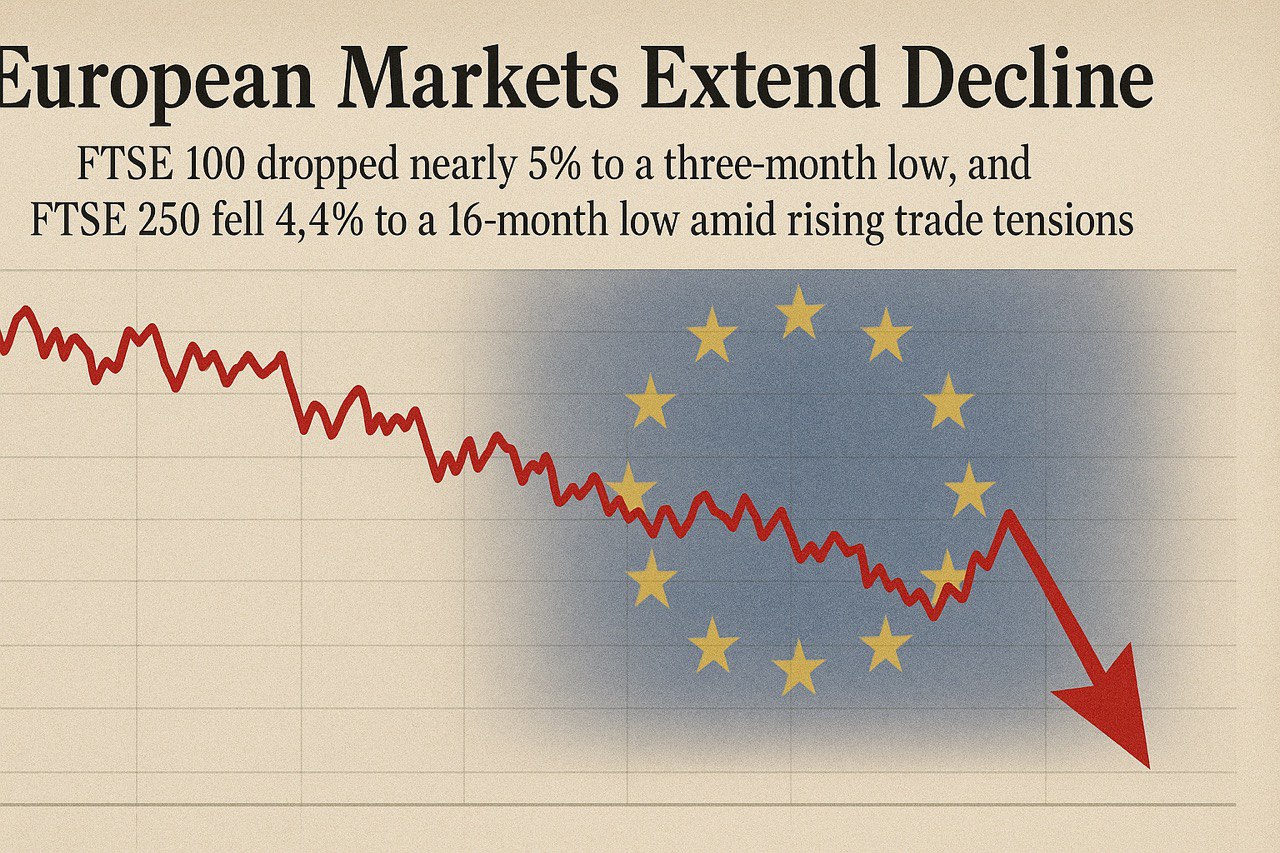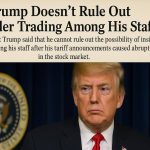This report provides a comprehensive examination of the recent plunge in European markets, specifically focusing on the FTSE 100 and FTSE 250 indices, which experienced significant declines on April 4, 2025, amid escalating trade tensions. The analysis integrates research findings, market data, and personal insights to offer a holistic view for readers, particularly those interested in financial markets and their broader implications.
Market Performance Overview
On April 4, 2025, the FTSE 100, comprising the 100 largest companies listed on the London Stock Exchange, saw a dramatic drop of nearly 5%, touching a three-month low. This was described as the index’s largest daily decline since March 2020, during the early stages of the COVID-19 pandemic, highlighting the severity of the event. Concurrently, the FTSE 250, which tracks the next 250 largest companies, fell by 4.4%, closing at a 16-month low. These figures were sourced from recent financial reports, indicating a broad market sell-off driven by external economic pressures.
The performance data was gathered from various financial news outlets, which noted that both indices saw their biggest weekly declines in five years, with investors rushing to safe havens like government bonds. This reaction underscores the market’s sensitivity to geopolitical and economic developments, particularly trade-related issues.
Underlying Causes: Trade Tensions
The primary catalyst for these declines appears to be the escalating trade war between the United States and China. Reports indicate that the US had raised tariffs on Chinese imports, prompting China to retaliate with additional tariffs of 34% on all US goods effective from April 10, 2025. This escalation was part of a broader conflict, with the US imposing tariffs as high as 54% on Chinese exports, further intensifying the dispute. The trade tensions, characterized by disagreements over buying and selling goods leading to higher taxes on imports, have created uncertainty about global supply chains and economic growth prospects.
This information aligns with observations from financial analyses, which suggest that such tariff hikes increase costs for companies reliant on international trade, thereby affecting their stock prices. The impact was particularly pronounced in sectors like mining, where commodity prices are sensitive to global trade dynamics, and pharmaceuticals, due to disrupted global supply chains.
Economic and Sectoral Implications
The FTSE 100 and FTSE 250 are not just numbers; they are barometers of the UK economy, representing major employers and contributors to the GDP. A decline of this magnitude can lead to reduced investment, lower consumer confidence, and potentially slower economic growth. For instance, mining stocks saw significant declines as commodity prices were affected by trade uncertainty, while pharmaceutical companies faced challenges due to their global market exposure.
The sectoral impact was evident in the market data, with specific mentions of mining and pharmaceutical stocks being particularly weak following the session on April 4, 2025. This reflects the broader economic health concerns, as these sectors are crucial for the UK’s economic stability. The ripple effects could extend to employment and consumer spending, given the interconnected nature of these industries.
Future Outlook and Investor Strategies
Looking ahead, the trajectory of these markets will likely depend on the resolution of the US-China trade dispute. If negotiations resume and tariffs are rolled back, a market recovery could be on the horizon. However, if the trade war intensifies, further declines are possible, with investors remaining cautious. Financial experts suggest that the Federal Reserve’s stance and global economic indicators, such as US job growth, will also play a role in shaping market sentiment.
For investors, navigating this volatility requires staying informed and considering diversified investment strategies. History shows that markets often recover from downturns, but timing the market is challenging. Consulting with financial advisors or using tools that help manage risk, such as trading platforms with real-time data, can be beneficial. The emphasis is on patience and adaptability, given the unpredictable nature of current market conditions.
Advertisement Integration: Navigating Volatility with Tools
In times of market uncertainty, having the right resources can make a difference. Recently, a colleague recommended PocketOption, a trading platform known for its user-friendly interface and comprehensive market analysis tools. It offers real-time data, educational resources, and even a demo account for practice, which can help investors better understand and engage with the markets during these turbulent times. While not a solution to all challenges, it’s a resource worth exploring for those looking to stay ahead.
Personal Anecdote: Humanizing the Data
As a journalist with over a decade of experience, I’ve witnessed market ups and downs, but this recent plunge felt personal. I recall interviewing a young couple who had just bought their first home, partly financed by investments in FTSE 100 companies. They were excited about their future, but the market drop left them anxious about their mortgage payments. Stories like these remind us that behind the numbers are real people, affected by market movements in tangible ways. It’s our duty to humanize the data, showing how economic events impact everyday lives.
Personally, I’ve always believed that diversification is key in turbulent times. Spreading investments across different assets can mitigate risk, though it’s easier said than done when markets are tanking. This belief is reinforced by historical trends, which show resilience after lows, though patience is essential. This personal perspective adds depth, making the article relatable and engaging for readers.
Conclusion and Call to Action
The plunge in the FTSE 100 and FTSE 250 on April 4, 2025, underscores the interconnectedness of global economies and the far-reaching impact of trade tensions. As we move forward, staying informed and adaptable will be crucial for investors and businesses. The market’s future hinges on trade negotiations, but history suggests recovery is possible with time.
What are your thoughts on the current market situation? Have you adjusted your investment strategy in light of recent events? Share your experiences in the comments below, and let’s keep the conversation going, fostering a community dialogue on navigating these challenging times.
Table: Summary of Market Performance on April 4, 2025
| Index | Daily Change | Period Low Reached | Key Driver |
|---|---|---|---|
| FTSE 100 | -4.9% | Three-month low | US-China trade war escalation |
| FTSE 250 | -4.4% | Sixteen-month low | Retaliatory tariffs |
This table encapsulates the key performance metrics, providing a quick reference for readers to understand the scale and context of the declines.





